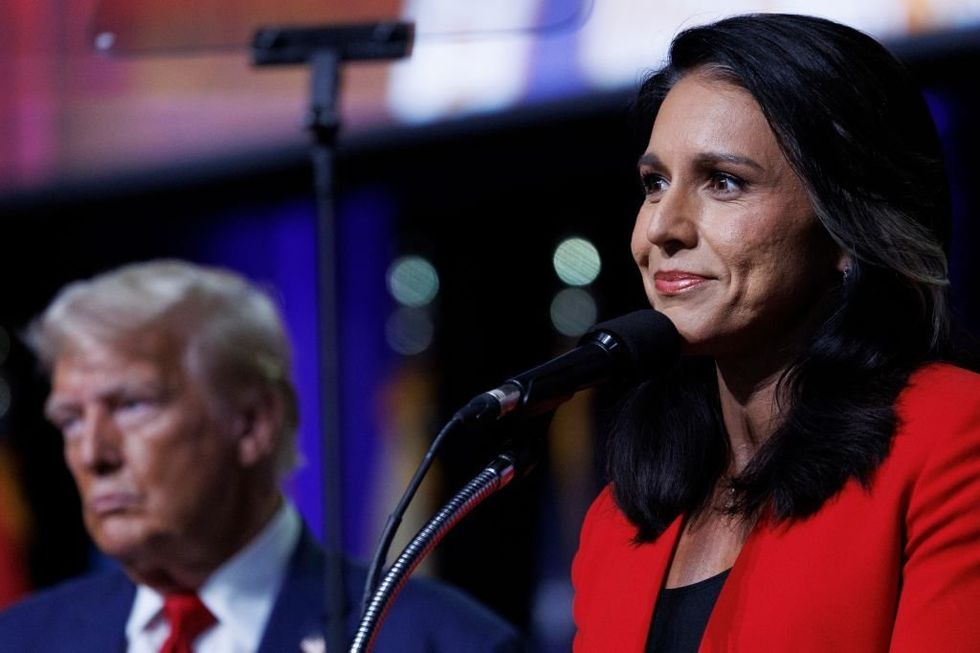
In less than 12 hours Tuesday, three news stories featuring anonymous Republican senators undermining President Donald Trump’s nominee for director of national intelligence appeared across D.C. newspapers. The pieces are part of a whisper campaign, not by Democrats but by Republican senators keen on blocking Tulsi Gabbard from the post.
But what threat does the former Democratic congresswoman pose in a role that is largely charged with coordinating intelligence? When the goal is total consensus, independent thinking is enough to attack your own president’s nominee.
An independent voice in the room is crucial, even if she’s not always correct.
Jewish Insider was first in the press salvo, publishing Tuesday morning that “DNI nominee Tulsi Gabbard faces rocky road to confirmation.”
The paper, a small, conservative, hawkish publication, has played a vocal role in opposing the president’s proposed foreign policy realignment and nominees. The day before its Gabbard piece, Jewish Insider published an article criticizing the administration’s pick for deputy assistant secretary of defense for the Middle East, Michael DiMino, and undersecretary of defense for policy, Elbridge Colby — both for apparently not stridently cheerleading for war with Iran.
On Monday, Jewish Insider attacked Trump confidant Tucker Carlson for reportedly not standing from his seat at the mention of Hamas’ Israeli hostages. On Wednesday, it published an article criticizing Dan Caldwell, an Iraq War veteran who advocates a more prudent, less hawkish foreign policy, over his role advising personnel decisions at the Department of Defense, as well as an interview with avowed Trump opponent Sen. Mitch McConnell (R-Ky.), touting his opposition to a more restrained foreign policy.
Twelve hours after Jewish Insider’s piece hit the shelves, Axios and Semafor followed suit. “Snowden support threatens Tulsi Gabbard’s Senate confirmation,” the Axios headline read. “Gabbard’s nomination on shaky ground,” Semafor echoed.
All three stories relied on myriad nameless Republican senators who took turns expressing doubts about the president’s nominee. None put their names out. The goal? As longtime Senate staffer and observer Rachel Bovard explained: “To create the appearance of momentum against Gabbard without ever owning the position in the light of day.”
So what is the position of director of national intelligence, and why are so many senators threatened by Gabbard’s nomination?
The DNI has no real budget to speak of. It’s an office created after 9/11, charged with coordinating and providing direction to the U.S. intelligence agencies as well as with briefing the president. In short, its influence is greater than its actual power.
Central Intelligence Agency nominee John Ratcliffe and national security adviser Mike Waltz aren’t getting the same pushback because, while not neocons, they’re also not about to start flipping tables in the national security world. They’re not major disruptors, so they’re allowed. The problem Gabbard poses to these hawks is not that she could derail the CIA or National Security Council so much as that she could be an influential independent voice in the room, one who has disagreed repeatedly with the intelligence community’s various consensuses, for better and for worse.
An independent voice in the room is crucial, even if she’s not always correct. Over the last eight years, powerful forces within the American intelligence community have tried to destroy Donald J. Trump.
Groupthink has dominated since the dawn of the Cold War. Presidents John F. Kennedy, Richard Nixon, and Ronald Reagan all tangled with that groupthink during their presidencies. Gabbard cuts a different way from most in “the Blob.” That’s an important asset to a president who, for example, might want a jaundiced eye on McConnell’s defense appropriations agenda.
The political reality is that the neoconservatives have caught their breath after the gut punch delivered to Sen. Joni Ernst (R-Iowa) over her initial opposition to Pete Hegseth for secretary of defense. They behaved themselves for a week and now are ready for another fight — but not ready to come out into the open yet. Senate Intelligence Committee Chairman Tom Cotton (R-Ark.) was quiet when the whisper campaign first debuted but issued a statement on X after the Beltway Brief reached out to his office.
“The media wants to deny President Trump’s crucial national security nominees a fair hearing by running anonymous smears,” Cotton posted Thursday afternoon. “This playbook may have worked in the past. It won’t anymore.”
He didn’t mention Gabbard by name. Cotton, a member of the more interventionist wing of the party, very likely wants to extract further concessions before he’s a yes. Still, the message to his colleagues on Senate Intel was clear enough: Cut it out. Cotton also scheduled Gabbard’s hearing as soon as he received the Federal Bureau of Investigation report Thursday.
Senate Majority Leader John Thune (R-S.D.) would do well to follow suit, publicly backing Gabbard if Republicans continue to pave a “rocky road” for the president’s pick. Grassroots Republicans just might take notice.
The Free Press: Trump has a mandate to lead. What comes next?
Blaze News: Second Republican comes out against Pete Hegseth
Blaze News: Lisa Murkowski denounces Trump’s J6 pardons
Blaze News:Pete Hegseth fends off another desperate attempt to tank his nomination
Blaze News: What’s next for Trump’s Cabinet nominees?
Sign up for Bedford’s newsletter
Sign up to get Blaze Media senior politics editor Christopher Bedford’s newsletter.
More/Source: https://www.theblaze.com/columns/opinion/whats-driving-the-gop-whisper-campaign-against-tulsi-gabbard

